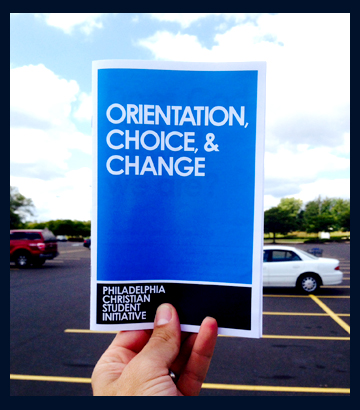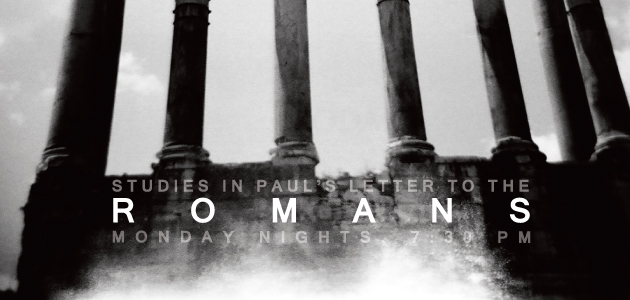Blog
New Student Resource
Over at the Philadelphia Christian Student Initiative site, we’ve posted a new resource you can download for free. It’s based on the studies we did at Young Adults over the summer, condensed into a 16-page booklet form.
Here’s the blurb from the website:
“Our culture has quickly developed a strong view of human desires we call “orientation.” Does the Bible agree with this view of humanity? And what about the possibility of human change? Orientation, Choice, and Change starts the discussion off on a biblical footing, and points in the direction of fruitful thinking and conversing about these crucial issues.”
Interested in free printed copies? Email info@phillystudent.org.
Download ePub, pdf, or text files on the PCSI resources page.
Dr. Jason Lisle at Young Adults
Dr. Jason Lisle at Young Adults Tonight
We’ll have a Forum-style night tonight at Young Adults.
Dr. Jason Lisle, the Astrophysicist who spoke at Calvary on Saturday night, will speak on apologetics (different than Saturday night here at Calvary), followed by Q&A.
See you!
Things that mess up prayer
We see clearly in scripture that God wants us to pray.
He also gives us instruction about what will mess our praying up.
Here’s a list of things that are mentioned in scripture as hindering or ruining both our ability to pray and our prayer’s ability to have power with God.
- “Regarding” or “cherishing” sin in my heart. (Psalm 66:18)
- Oppression of the poor and lack of attention to justice. (Proverbs 21:13, Isaiah 58:1-59:3)
- Violence. (Isaiah 1:15-17, Isaiah 59:1)
- Refusal to listen to God’s revealed will. (Proverbs 28:9)
- Asking for things simply to satisfy my lusts. (James 4:3)
- Refusal to forgive others. (Mark 11:25)
- Mistreating my wife. (1 Peter 3:7)
- Doubting when I ask. (James 1:6-8)
- Refusal to reconcile and agree with the body of Christ. (Matthew 5:23-24, Matthew 18:19)
Follow Julianne In Uganda
Last night Julianne Heilman shared about her upcoming move to Uganda to be a part of the ongoing mission work with Calvary Chapel Entebe.
Bookmark her blog here:http://juliannesjourneys.wordpress.com/
And check out the Facebook event for the open house being held for her this Sunday here: https://www.facebook.com/events/514141911996399/
A first look at Romans: Notes from last night
Last night we began our Autumn journey through Paul’s letter to the Romans, looking at the first seven verses of Chapter 1. Here are the notes:
1. Notice the structure of the verses.
“Paul” (v.1)…”to all who are in Rome” (v.7)
- Things about Paul (v.1 & 5) (“a slave and apostle”)
- Things about Paul’s message (v.2-3)
- Things about who Paul’s writing to (v.6-7)
2. Working out from the center
Things about Paul’s message (v.2-3) (“The Gospel of God”)
1. It is not a new thing, but was promised by the ancient Israelite prophets (v.2)—by God.
2. It is about Jesus. (v.3) God’s good news is…Jesus.
Who He is is the good news for all of us.
- He “came” into the family of David’s descendants. (v.3)
- He pre-existed
- He is part of the royal line prophesied to save and rule the world forever (See Psalm 2, Psalm 110, and Psalm 89:19-29)
- He was then “declared” or “appointed” the “Son-of-God-in-Power” (v.4). That is, He took on a new status as ruler over the world, after death and resurrection (See Mt 28:18, Acts 2:32-33)
Paul’s message, what God wants everyone to know, is that He has provided a man who has the power and authority to fix everything. He came and showed us how good and trustworthy and powerful he is, then he died in our place and rose from the dead. Right now he is carrying out his plan through everyone who relies on Him. Soon He will come back to wipe out evil completely and rule the earth forever. God’s good news is about who He has provided for us.
Things about Paul (v.1 & 5)
v. 1 He’s a bondservant of Jesus Christ
- Called to be an apostle
- Separated to the Gospel of God
v. 5 He Received grace and apostleship
- For the purpose of brining about faith and obedience
- Non-Jewish in focus, worldwide in scope
Paul was a person God himself chose and appointed for the task of proclaiming this message. The message is to proclaim Jesus as God’s answer, and to call all people to trust and obey Jesus as their Lord and only hope.
Things about who Paul’s writing to (v.6-7)
- They were in the city of Rome
- They were Christians
3. What this letter is for us
1. a word “from God” (v.7), not just from Paul.
2. a channel of Grace and peace for you.
New PCSI Facebook Page
 I just set up a Facebook page for news and updates from the PCSI. Check it out if you want here:
I just set up a Facebook page for news and updates from the PCSI. Check it out if you want here:
https://www.facebook.com/pages/Philadelphia-Christian-Student-Initiative/225679250921956
Will history judge us?
I ran across this quote in the Washington Post the other day:
“History would judge us all extraordinarily harshly if we turned a blind eye to a dictator’s wanton use of weapons of mass destruction against all warnings, against all common understanding of decency,” [Secretary of State John] Kerry said. “These things we do know.”
Of course, the Secretary of State has very difficult decisions to be a part of, and I don’t envy the weight our governing officials bear in these situations. So I’m not commenting here on the subject [the Syrian conflict] he’s addressing.
What struck me was something in the way he advanced his case, and it’s something I think is helpful for all of us to notice, because it is very much in the air we breath in all of our interactions with people today.
First, there is the strident moral tone he adopts. Mr. Kerry is representative of our entire national dialogue today on everything from the environment to marriage to abortion and on down the line. We are absolutely brimming with moral language and moral positions, but I can’t help but wonder, every time I encounter it, where does it all come from? I think it’s important for us to ask our classmates and co-workers and teachers, and in fact (in love) to hold everyone to this point: where does all this moral passion come from? Why do we feel so strongly about some things, and how can we know so clearly that we hold the right position? For instance, I would be interested to ask our Secretary of State what moral code he ascribes to, and what moral authority gives him the foundation he needs to decide things like whether to go to war? If we’re going to be motivated to do things or think things for moral reasons, shouldn’t we know the authority behind these reasons?
Second, we should see that Mr. Kerry (probably instinctively) does not mention God, and yet he is worried about being judged (morally) at some future date. The judge he’s worried about? History. And he’s not alone. These things get said every day. Though it makes it a little vague to use the impersonal word “history,” what we’re saying as a people is that we worry about what future generations will think about us. How will we be viewed by those humans who will come later? What will they write about us in their books? How will they play us in their movies?
These future generations of people will have access to the moral information they need to appraise us rightly, we seem to think, and they will decide if we were the kind of people they approve of.
Third, we should see that Mr. Kerry gives us the standard which future generations will use to judge us: “common decency.” This seems to be the idea that in the future people will share a general idea of what is “decent”–what should and shouldn’t be done–and they will look to see if we acted in accord with this idea. So the moral law we’re working with here is one shared by a large group of future humans who decide what’s decent.
Lastly, Mr. Kerry ends with the definitive statement, “These things we do know.” How he knows these things would be a very interesting avenue of conversation.
But what should Christians make of all this, and of the many similar conversations we find ourselves in on a whole host of issues?
We should affirm that there is a future judgment all human beings face, and a moral law to which we will all be held accountable. But the judge will not be future generations of humans who are just like us. The judge will be only One–God, in the person of the man Jesus Christ. Which means that his moral law is the only one we need to worry about. It’s not history we need to worry about, it’s the one who rules over history.
We should question this sense of “common decency” we’re constantly being asked to assent to. What is it? Who decides what is commonly decent? What if two people disagree? What if whole cultures disagree? And why should we care what people think about morality anyway? We need to direct people to a point of reference outside of mere humanity.
Finally, we should (as I said above) help people think about why they experience these moral positions. It just doesn’t make sense why we would all be so moral if we’re just accidents of nature. And even if we were accidentally moral, it wouldn’t mean that those morals meant anything.
But we all know, deep in our hearts, that they do mean things. This sense of “that’s right” and “that’s wrong”–even if it’s misguided, and we can’t all agree–the very existence of that moral sense at all testifies to a deeper truth about what we really are. Even if our compass is broken, we need to ask why the compass is there at all.
We are made in the image of God, who is a moral being. And so, we are too. Let’s get those around us thinking about these things, and not let people settle for unreflective herd morality.
History will have nothing to say about it in any way that matters. But God has much to say.
The Philadelphia Christian Student Initiative
 I wanted to take a second to direct those of you who are interested to a new campus ministry project I’m trying this year. I’m calling it the Philadelphia Christian Student Initiative, and it’s starting out by offering free resources and speakers to local campuses in and around the city. We’ve got Dr. Jason Lisle (who’s going to be here at church soon) signed up to speak at one school already.
I wanted to take a second to direct those of you who are interested to a new campus ministry project I’m trying this year. I’m calling it the Philadelphia Christian Student Initiative, and it’s starting out by offering free resources and speakers to local campuses in and around the city. We’ve got Dr. Jason Lisle (who’s going to be here at church soon) signed up to speak at one school already.
For those of you who are part of our Young Adults groups, and in school, I’m writing these PCSI booklets specifically to help address some of the issues you face, in terms of both spiritual life issues and intellectual issues. (Some of you helped with input for the one on dorm life… thanks!)
If you want free copies of any of this stuff for your campus I can get it to you, and it’s all available for download in several formats at the website: http://phillystudent.org.
I’m hoping to keep putting out a new booklet every month during the school year, so check the site to keep up on news.
This is all part of a larger effort I feel led to make in order to assist all of you who are at school. Whether you are close to home still, or “far away,” please let me know how I can help you personally and in terms of helping you further the gospel on your campus.
Visit the PCSI website for downloads and info.
Update:
Visit the PCSI Facebook page here.
Find PCSI on Twitter at twitter.com/PCSINews




